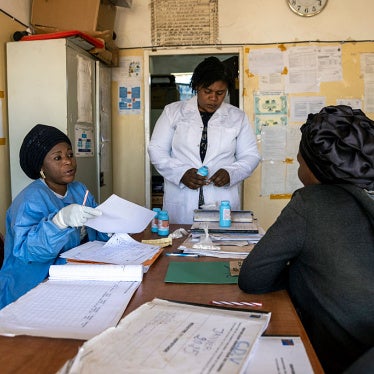A 16 year-old boy is fighting for his life in a Paris hospital. On June 13, Darius was found by a neighbor in a supermarket cart, unconscious, on the side of a road.
Whatever the motives of his attackers turn out to be—and no motive could justify the violent attack against him—this horrific crime doesn’t come out of the blue.
Darius is Roma, a group regularly reviled by French politicians and in the media.
The prosecutor in charge of the case, who called the act “barbaric,” said that a group of people—exact number unknown—attacked Darius, leaving him with multiple injuries particularly to his head. The prosecutor suggested it could have been a reprisal following a burglary in the area.
President Francois Hollande, Prime Minister Manuel Valls and Interior Minister Bernard Cazeneuve have rightly condemned this terrible attack. But so far there hasn’t been any official acknowledgment of the poverty and discrimination Roma face on a daily basis in their countries of origin and in France or of the negative rhetoric aimed at them by politicians from all sides. There hasn’t been any questioning of whether this stigmatization may have contributed to the fact that today, Darius is in a coma.
Roma families, many of whom fled discrimination and persecution in their own country, live in camps and squats that seem to belong in another place and another era but certainly not France in 2014. As if the conditions in the camps weren’t bad enough—they often lack running water or trash collection—the families are repeatedly evicted, despite the disruption this causes to health care and to children’s education.
When he was running for President, Francois Hollande promised his government would reverse Nicolas Sarkozy’s policies toward the Roma. But in reality the approach of the Hollande government has been to evict, expel and sometimes to stigmatize Roma, much as his predecessor did.
Nongovernmental organizations have reported that evictions of Roma doubled in 2013 from 2012, most without adequate alternative housing being offered. Prime Minister Valls, when he was interior minister, claimed publicly that most Roma don’t want to integrate in France and that they should be sent back to Romania or Bulgaria.
The latest report by the National Consultative Human Rights Commission (CNCDH) described widespread and increasing prejudice against Roma in France. It found that “even people who consider themselves not racist have negative stereotypes against Roma.”
It seems that in many people’s minds, Roma are equated with crime, slums and begging, not the discrimination they face, the forced evictions they’re repeatedly subjected to and the despair of having no job and nowhere to go.
In April an internal instruction to police officers in the wealthy sixth arrondissement in Paris to systematically evict Roma living on the street was leaked to the press. It brought to mind an order in August 2010 to French prefects to target Roma living in informal settlements for eviction, provoking outrage at the time and leading to its withdrawal by the government. But the reality has remained the same.
Another 2012 order instructs prefects to try to find alternative housing for families facing eviction and ensure they continue to have access to healthcare and education. But it is not binding, is rarely applied and evictions are going ahead as they had been. In fact, rights groups working with Roma are reporting worsening living conditions as a consequence of these repeated evictions.
The government has a duty to protect everyone in France, including Roma, from crime and discriminatory treatment, and a responsibility not to engage in stigmatizing rhetoric.
President Hollande, Prime Minister Valls and Minister Cazeneuve should say loud and clear that anti-Roma abuse will not be tolerated, and change their eviction policy, which only forces people into further misery. This means not speaking out just when a child is brutally attacked, but repeating this message until people start to change their attitude toward Roma.
The summer is here, and unless the government acts now, we will see more evictions on a mass scale, families forced to live in undignified conditions and in all likelihood more violence. This is not worthy of today’s France.
Izza Leghtas is a Western Europe researcher at Human Rights Watch.







